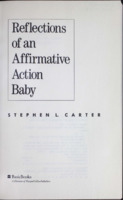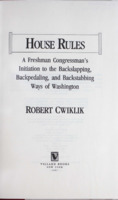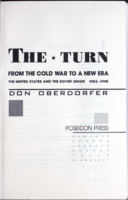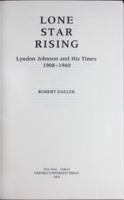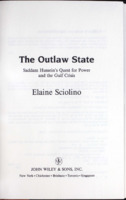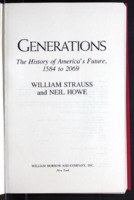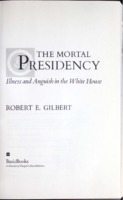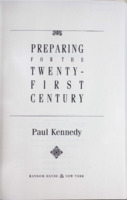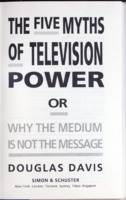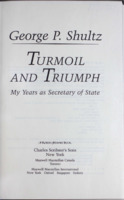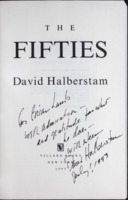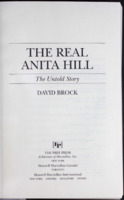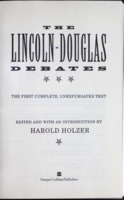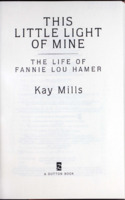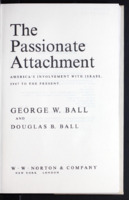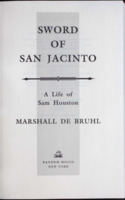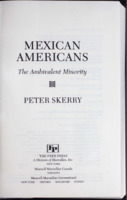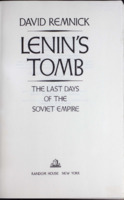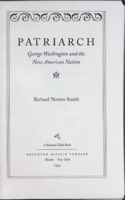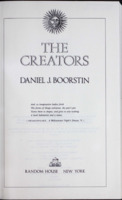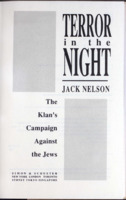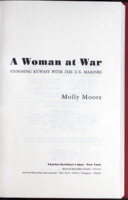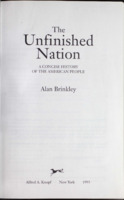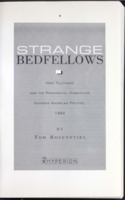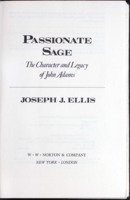Search
728 items
-
Reflections of an affirmative action baby
Steven L. Carter's work on racial preference as told from his own personal experience. -
House rules : a freshman Congressman's initiation to the backslapping, backpedaling, and backstabbing ways of Washington
Robert Cwiklik's account of a first-year member of Congress. -
The turn : from the cold war to a new era : the United States and the Soviet Union, 1983-1990
Don Oberdorfer's account of U.S.- Soviet relations at the end of the Cold War. -
Lone star rising : Lyndon Johnson and his times, 1908-1960
Volume one of a two-volume biography follows Johnson's life from his childhood on the banks of the Pedernales to his election as vice president under Kennedy. -
The outlaw state : Saddam Hussein's quest for power and the Gulf crisis
The story of Saddam Hussein and his fierce determination to turn Iraq into a regional superpower in the Middle East which lead to the Persian Gulf War. -
Generations : the history of America's future, 1584 to 2069
The book that challenges forever your view of our national legacy and our destiny--Jacket subtitle. -
The mortal presidency : illness and anguish in the White House
Robert Gilbert's account of death and illness in the White House. -
Preparing for the twenty-first century
Human history has always been shaped by the growth and migration of populations, by the opportunities and constraints provided by the environment, and by the rise of new technologies. Today, these forces are enmeshed in a state of unprecedented turbulence. World population has more than doubled in the past forty years to reach its current level of 5.5 billion, and it will exceed 8 billion and perhaps even 10 billion early in the next century. How will these vast numbers reshape the world's borders, strain an already fragile ecosystem, and remake politics? New technologies are even now replacing traditional work with radically new systems of production and communication, promising enormous changes in both industrial and traditional agricultural societies. Will potential developments in biotechnology render traditional food producers obsolete? What is the role of robotics in a world where millions of new jobs are needed each year to absorb the fast-growing population? And what will the roles of women be? How will the spread of AIDS affect the rapid growth of population in countries like India or those of central Africa? And how will all these complex, mutually dependent changes affect individual nations as they struggle with their own ethnic and economic pressures, including the inevitability of ever larger migrations from poorer to richer parts of the world as populations explode in less developed regions and decline in such areas as Japan, parts of North America, and the European continent? Given their historic behavior, how will Japan, the United States, and Europe - as well as the countries of Asia, Africa, and Latin America - be likely to respond to these unprecedented circumstances? What is the role of education in a two- or three-tier world? Professor Kennedy's classic The Rise and Fall of the Great Powers considered the forces within nations that led to their rise and fall. In Preparing for the Twenty-first Century Kennedy addresses a larger and uniquely modern question: how will transnational forces in a world of scarce resources, instant communications, and exploding population affect the nations of the world and the people who inhabit them as the new century dawns? -
The five myths of television power, or, Why the medium is not the message
The Five Myths of Television Power is a provocative and controversial book. It challenges the conventional assumption, repeated every day, that television dominates American life - if not the life of the entire world. Douglas Davis takes on this belief with arguments that will change the way we all view television. Is TV-as-we-know-it dying? Douglas Davis contends that television's perceived power is just that - only perception, not fact, grossly exaggerated, and damaging to our national life. In The Five Myths of Television Power, Davis shatters the following myths: TV controls our voting. TV destroys our students. TV is (our) reality. TV pacifies us and keeps us at home. We love TV. Davis analyzes many of television's most famous "events," from the home tapes that recorded the beating of Rodney King and, later, the Los Angeles riots, to the Gulf War, to the Clarence Thomas hearings, to Murphy Brown's illegitimate child and the surprising 1992 elections. Throughout he proves that the medium is hardly omnipotent, crushing all resistance in the viewers who turn it on. Rather, it is "a fat-bellied emperor unclothed, ready to succumb to leaner, looser, more invigorating competition." He warns that "traditional" television, if it remains complacent and unwilling to change, will self-destruct before a host of media and print challengers. The Five Myths of Television Power will stir debate within the TV networks, the new cable TV empires, and among editors, publishers, students of media and the arts, and liberated TV viewers everywhere. Americans are tired of being told that they cannot think for themselves - the hidden message of Marshall McLuhan's books. The Five Myths of Television Power refutes McLuhan. It recasts the relationship of the viewer to television in an entirely new direction - one that empowers the viewer, and one that television executives should heed. -
Turmoil and triumph : my years as secretary of state
Autobiography of former Secretary of State, George Shultz. -
The fifties
The Fifties is a sweeping social, political, economic, and cultural history of the ten years that David Halberstam regards as seminal in determining what our nation is today. It is the decade of Joe McCarthy and the young Martin Luther King, the Korean War and Levittown, Jack Kerouac and Elvis Presley. "Halberstam not only gives us the titans of the age - Eisenhower, Dulles, Oppenheimer, MacArthur, Hoover, and Nixon - but also Harley Earl, who put fins on cars; Dick and Mac McDonald and Ray Kroc, who mass-produced the American hamburger; Kemmons Wilson, who placed his Holiday Inns along the nation's roadsides; U-2 pilot Francis Gary Powers; Grace Metalious, who wrote Peyton Place; and "Goody" Pincus, who led the team that invented the Pill. Here is a portrait of a time of conflict, at once an age of astonishing material affluence and a period of great political anxiety." "We follow, among other things, the quickening pace of American life and the powerful impact of national television, still in its infancy, on American society: from the Kefauver hearings to I Love Lucy to Charles Van Doren and the quiz-show scandals to the young John Chancellor of NBC covering the Little Rock riots and holding up a disturbing mirror to America."--Book jacket. -
The real Anita Hill : the untold story
More than a year and a half after the dramatic confrontation between Clarence Thomas and Anita Hill, opinions remain sharply divided on which one was telling the truth, and on the episode's significance and meaning for American society.Opinion polls conducted on the first anniversary of the hearings showed that public sentiment in Thomas' favor had weakened, while Anita Hill has become a national celebrity, a heroine credited with putting sexual harassment on the national agenda and thus a symbol of the feminist and civil rights movements who is said to have inspired a political "year of the woman." The press has characterized the Hill-Thomas confrontation as an impenetrable mystery whose truth can never be known - an American version of Rashomon. But journalist David Brock dissents from this conclusion. His investigation shows that while there may indeed be no way of knowing exactly what transpired between Thomas and Hill, a great many things can be known about Anita Hill that were not previously disclosed which sharply contradict her public image and raise serious doubts about her credibility. Brock corrects numerous misconceptions and introduces new factual evidence to answer many questions left open by a notably uninquisitive national press. In the course of his investigation, the official record of the Senate hearings is examined more carefully than the senators' histrionics and the distorting lights of national television cameras permitted at the time. Evidence is brought forth that has never before been made public, including sworn affidavits, confidential Senate interviews of witnesses, and sections of the FBI file on the Thomas nomination. Numerous details from the report of special investigator Peter Fleming on the leak of Hill's charges, veiled by a media blackout, are unsheathed. And new information gleaned from extensive interviews is reported. This book is not about whether Clarence Thomas should have been confirmed to the Supreme Court. Nor does it question whether sexual harassment is a genuine offense. Rather it seeks to determine whether sexual harassment occurred in this case. While partisans of Hill may remain unpersuaded, no matter what the weight of evidence suggests, Brock believes that after hearing all the facts, no reasonable reader will be able to conclude that it did. -
The Lincoln-Douglas Debates : The First Complete, Unexpurgated Text
In the blistering summer of 1858, as America teetered on the brink of disunion, two Illinois politicians seized the nation's attention and gripped it for two extraordinary months. Through the sheer force of their words, personalities, and ideas, Abraham Lincoln and Stephen Douglas transformed a local contest for the U.S. Senate into a watershed national debate on the contentious issue of slavery and, indeed, on the principles upon which this country was founded. Yet what Lincoln and Douglas really said in those seminal debates has long been suppressed. At the time, newspapers were blatantly partisan, and though stenographers took down the speeches word for word, editors and transcribers subsequently "improved" their candidate's remarks while printing his opponent's words, warts and all. What has been reprinted ever since are the "improved," inaccurate versions. Harold Holzer has uncovered unedited texts of the debates, and this book will be the first ever to present all seven of them in their unexpurgated entirety. Besides the first true transcription of the debates, Holzer offers, through an Introduction and extensive notes, crystalline portraits of the combatants - their personalities and bearing, their quirks and foibles. Holzer also casts a brilliant light on the "house divided against itself," showing us an America at once exuberant and deeply uncertain about its future. He provides trenchant evocations of the physical and emotional stages on which the debates were set. We glimpse the feverishly enthusiastic audiences that mobbed the debates. We also witness the exceptional fervor with which the entire country followed them. Lincoln and Douglas galvanized a nation and permanently transformed our national consciousness with the speeches they gave during the summer and fall of 1858. To read the words these men actually spoke in their historic confrontation is an opportunity to witness the apex of American political discourse. Here - for the first time in more than 130 years - are those words. Here - at last - is that opportunity. -
This little light of mine : the life of Fannie Lou Hamer
Profiles the 1960s endeavors of dedicated civil rights activist Hamer. Awards: Christopher. -
The passionate attachment : America's involvement with Israel, 1947 to the present
In his Farewell Address, George Washington admonished his fellow citizens to steer clear of a "passionate attachment" to another nation, as such could create "the illusion of a common interest ... where no common interest exists." This warning echoes through the pages of this unflinching examination of our four-decade entanglement in the web of Middle East politics. The distinguished authors here trace the sequence of events that brought the United States into a relationship unique in its history, with its foreign policy often manipulated by another, much smaller nation. The costs have been financial: American aid to Israel well exceeds the total of U.S. payments to reconstruct postwar Europe. The costs have been political and moral: denouncing arms sales as destabilizing to the Middle East, the United States has poured weapons into Israel; while championing national self-determination, the United States has failed to do anything effective to halt Israel's colonization of the West Bank. Israeli forbearance from entering the Gulf War in 1991 and thereby undoing the coalition of Arab States put together by the Bush administration further intensified our passionate attachment. To achieve a durable settlement in an area beset by age-old disputes, the authors call for an end to our unquestioned acquiescence in Israeli action and a broadened role for collective security. -
Sword of San Jacinto : a life of Sam Houston
Using new material, the author re-creates Houston as a frontiersman, soldier, and politician, plus his tumultuous personal life. -
Mexican Americans : the ambivalent minority
Some of us have been here for three hundred years, some for three days. This comment, often repeated by Mexican Americans, affirms their status as one of America's oldest ethnic groups, as well as one of its newest and fastest growing. Not surprisingly, many observers (including some Mexican Americans) are concerned about the impact of the burgeoning number of Mexican immigrants on our society - anxieties exacerbated by leaders whose demands for bilingual schools and ballots challenge the goal of assimilation. -
Lenin's tomb : the last days of the Soviet Empire
A moment in history, the collapse of the Soviet empire, is examined along with the restoration of truth in the region, the truth about the brutal Soviet past and the bleak Soviet present. -
Patriarch : George Washington and the new American nation
When George Washington agreed to take on the presidency of his new nation, he inspired gratitude and adulation on a scale almost impossible to imagine today. In the years that followed, he would need every ounce of his countrymen's affection as he presided over a government threatened by internal dissension and foreign war. This is the story of Washington under political siege, a trial no less demanding than the Revolutionary War. George Washington emerges in these pages as a necessary hero. Indeed, it is hard to imagine the survival of the young republic without him. We watch him preside over the bitter quarrels within his brilliant Cabinet - enduring the historic feud between Jefferson and Hamilton while struggling successfully to keep the nation out of European conflict. On the personal level, this moving biography confirms Henry Knox's judgment that it was Washington's character, and not the recently signed Constitution, that held the infant Union together. In a supremely readable history, Richard Norton Smith gives us vivid descriptions of stagecoach travel, the capital's yellow fever epidemic of 1793, and life at Washington's beloved Mount Vernon. This George Washington, vastly more human than our inherited image, is a fallible man subject to vanity and disappointment, yet all the greater for his vulnerability. Patriarch tells not only what Washington did but, memorably, what he was like, and how both were essential to the birth of the American Republic. -
The creators
A narrative of the great figures who have created our cultural heritage, from the pyramid builders to Picasso, enriching our world with architecture, painting, sculpture, music, drama, dance, and literature. -
Terror in the night : the Klan's campaign against the Jews
Pulitzer Prize winner Jack Nelson, familiar to millions from TV's Washington Week in Review, is one of America's toughest reporters. For over forty years, he has covered it all, seen it all - and told the truth. One story stands out for him above all others. Now in the tour de force of his long career, Nelson shows us the civil rights movement's last unreported front - the Ku Klux Klan's war against Southern Jews. Piece by piece, Nelson re-creates this bitter campaign. and assembles the secrets surrounding what is perhaps its most disturbing episode: a top secret plan to trap the Klan's most elusive bomber. In 1967, Nelson was a young reporter covering his home state of Mississippi. Around him, the South was exploding. As citizens absorbed the news of the brutal slayings of three Northern civil rights workers, the Klan set its sights on a new target - Southern Jews. Quietly, the Klan's top bomber slipped across state lines. In the fall of 1967, the battle began as a crude explosive device ripped through the walls of the newly completed Temple Beth Israel in Jackson. A few months later, the home of the temple's rabbi was reduced to ruins by a second bomb. Reports of hit lists and new targets spread through the South. When the third bomb exploded on May 27, in a synagogue in the small town of Meridian, Mississippi, the Jewish community cried out for action. When the FBI discovered a Klan plot to bomb another synagogue, this time with women and children inside, the rage grew uncontrollable. A plan that some thought too dangerous, too risky, too radical was put into action by FBI men and local police, bankrolled by the Jewish community. Nelson shows us how this plan played out, despite a last-minute near disaster. We meet unforgettable characters, including the Hawkinses, the Klan's fiercest family; the police and the agents; and Kathy Ainsworth, the quiet schoolteacher whose secret life included midnight bombings and a lover whom few Klan members knew by name, a man whose bombs had ignited terror throughout Mississippi. Terror in the Night is exciting reading and truly extraordinary journalism. -
A woman at war : storming Kuwait with the U.S. Marines
During the Gulf War, most journalists were confined to media pools. But not Molly Moore, the senior military correspondent of The Washington Post. Moore was the only reporter to accompany a senior commanding general as he led his troops into battle in Kuwait. This is her eyewitness account of the war as she lived it by the side of the top Marine general, Walter E. Boomer. There has never been a book quite like Molly Moore's, for hers is the unique story of what a woman experienced inside the Gulf War military machine - in a male-dominated military amidst an Islamic culture in which women are on a level with the family pet. -
The unfinished nation : a concise history of the American people
An historical work which details the diversity of the American people. -
Strange bedfellows : how television and the presidential candidates changed American politics, 1992
As the presidential campaign of 1992 began, the television networks approached it with dread. The media honchos assumed the public had turned off to politics, George Bush was a shoo-in, and they would earn only blame for whatever they did. They became more intent on cutting their costs than in covering the campaign. "Thus, as preparations for the New Hampshire primary began, ABC, the leading news network, decided to assign only one off-air producer to each candidate; the other two broadcast networks were going to do even less. The result of this early decision was that the networks found themselves playing catch-up for much of the unpredictable campaign of 1992. And the candidates found themselves establishing new arenas in which to present themselves to an attentive public. Televised town-hall meetings, appearances on Donahue, Larry King, Arsenio Hall, Good Morning America, and almost every other nontraditional media format became the vehicle for supplying voters with the information the candidates wanted them to have." "No one could have foreseen the shaping of this campaign, but early in 1991, Tom Rosenstiel, award-winning media and politics reporter for the Los Angeles Times, had decided to write Strange Bedfellows, a book that would follow a network for an entire campaign. ABC granted Rosenstiel complete access to their news division, and with this unprecedented access, he shows us how the media shaped and misshaped the improbable campaign of 1992, how the mysterious world of network television news operates, and how the networks are seeing their influence over the news shrivel in the rapidly changing era of New Media." -
Passionate sage : the character and legacy of John Adams
John Adams, one of the Founding Fathers of our nation and its second president, spent nearly the last third of his life in retirement grappling with contradictory views of his place in history and fearing his reputation would not fare well in the generations after his death.In an incomplete autobiography, and in numerous publications and voluminous correspondence with Thomas Jefferson and many others, John Adams argued and railed against those who disagreed with him or made little of his contribution to our country's political foundations. And indeed, future generations did slight him, elevating Jefferson and Madison to lofty heights with Washington while Adams remained way back in the second tier. Now, in a witty, clear, and thoughtful narrative of Adams's later life at his home in Quincy, Joseph Ellis explores the mind and personality of the man as well as the earlier events that shaped his thinking. Readers will discover Adams to be both contentious and lovable, generous and petty, and the most intellectually profound of the revolutionary generation, a man who may have contributed to the earlier underestimates of his role in history, and whose perspective on America's prospects has relevance for us today.
